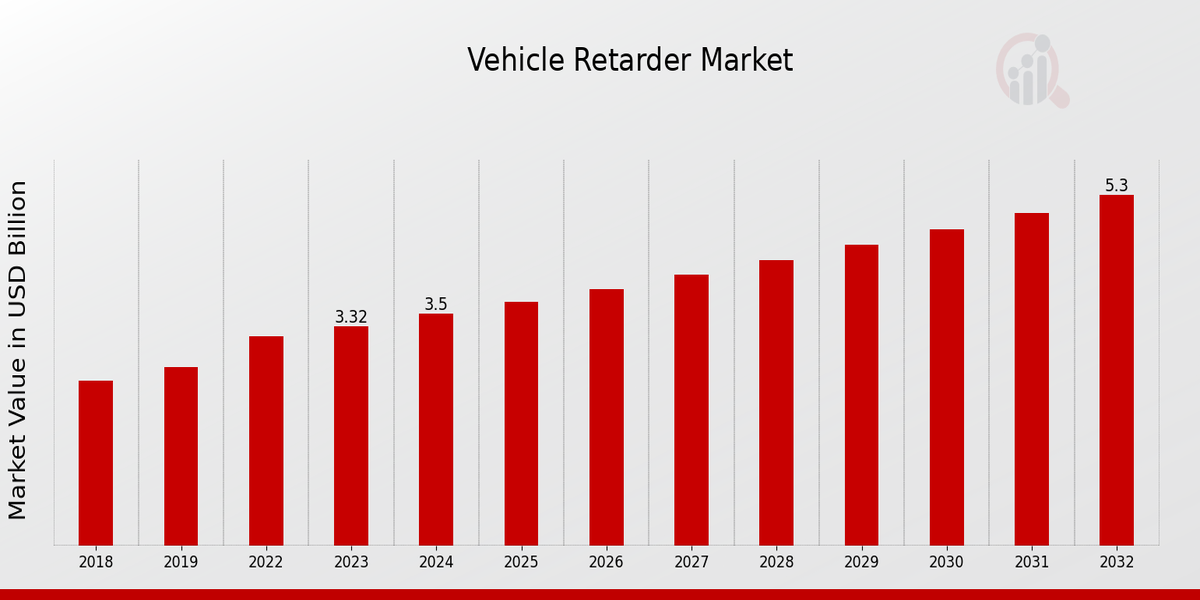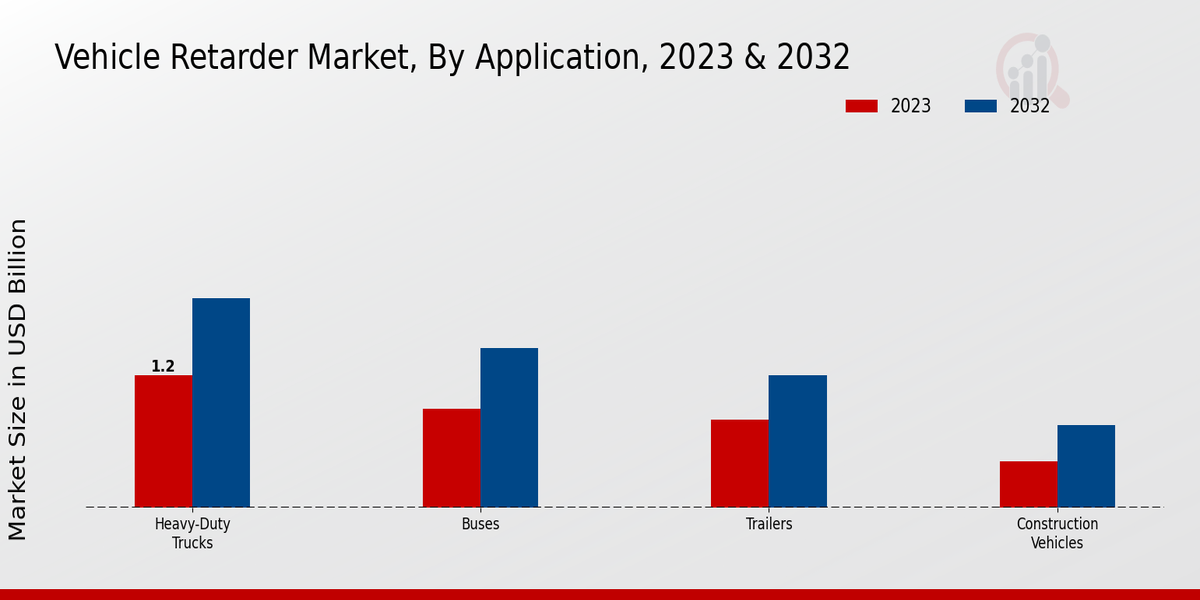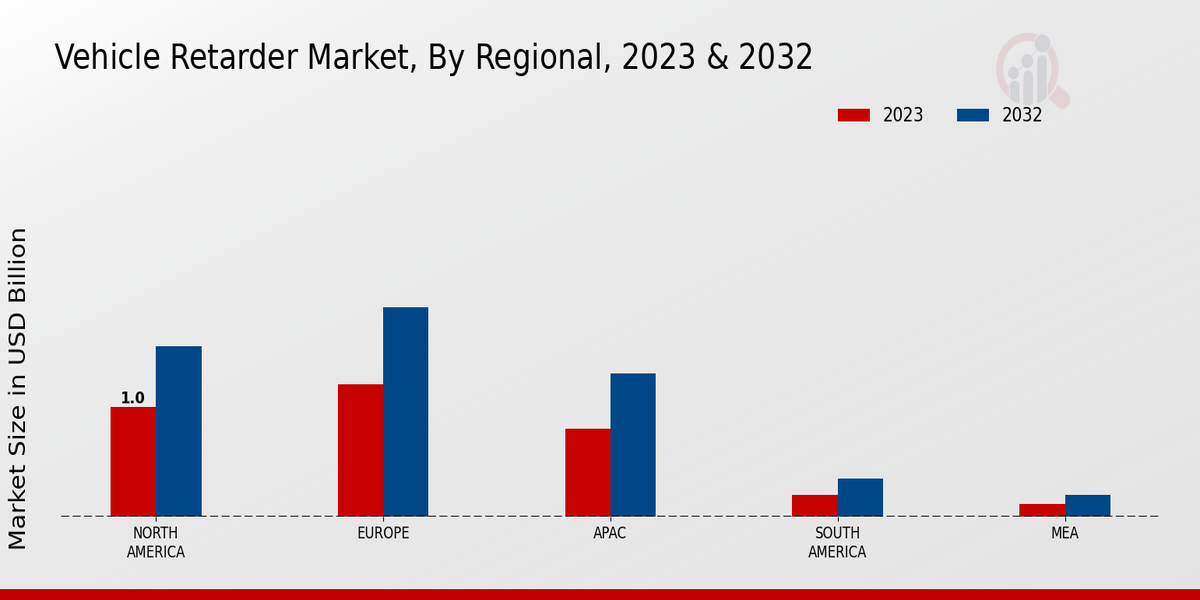Global Vehicle Retarder Market Overview
As per MRFR analysis, the Vehicle Retarder Market Size was estimated at 3.16 (USD Billion) in 2022. The Vehicle Retarder Market is expected to grow from 3.32 (USD Billion) in 2023 to 5.3 (USD Billion) by 2032. The Vehicle Retarder Market CAGR (growth rate) is expected to be around 5.33% during the forecast period (2024 - 2032).
Key Vehicle Retarder Market Trends Highlighted
Due to stricter safety and pollution laws as well as the growing demand for commercial vehicles, the Vehicle Retarder Market is expanding significantly. Manufacturers are being forced to innovate and incorporate cutting-edge retarder technology into cars due to growing traffic congestion and the demand for improved braking systems.
This improves handling and lessens the strain on conventional braking systems. Furthermore, because vehicle retarders help with energy recovery during braking, their use is increasing as a result of the emphasis on energy-efficient solutions. This market offers a number of prospects that merit further investigation.
The emergence of hybrid and electric cars offers a special opportunity to create sophisticated retarder systems that work with new powertrains. Furthermore, expansion in the transportation and logistics industries may raise demand for strong braking systems that improve vehicle performance and safety.
Various emerging markets are also recognizing the benefits of retarders, thus creating potential for expansion and partnerships in these regions.
Recently, there has been a noticeable trend toward technological advancements in retarder systems, with manufacturers focusing on improving efficiency and reliability. The integration of smart technologies is on the rise, allowing for real-time data analysis and better performance monitoring.
Moreover, as manufacturers emphasize sustainable practices, the development of eco-friendly retarders is becoming a focal point.
The evolving market landscape appears to prioritize safety, efficiency, and environmental sustainability, ultimately shaping the future direction of the Vehicle Retarder Market. This blend of innovation and commitment to safety is likely to drive further advancements and adoption of vehicle retarders.

Source: Primary Research, Secondary Research, MRFR Database and Analyst Review
Vehicle Retarder Market Drivers
Growing Demand for Commercial Vehicles
The Vehicle Retarder Market is witnessing a substantial rise in the demand for commercial vehicles across various sectors such as logistics, construction, and public transportation.
This surge can be attributed to an increase in global trade activities and urbanization, which have led to a greater need for efficient transportation systems. Vehicle retarders play a crucial role in enhancing the safety and efficiency of these commercial vehicles.
With regulatory bodies increasingly emphasizing safety measures, the integration of advanced vehicle retarders in new truck and bus models has become essential. This growing trend towards heavy-duty vehicles is expected to significantly propel the market as vehicle manufacturers focus on incorporating cutting-edge technology to improve vehicle performance and safety.
In addition, as businesses expand their fleets and seek to optimize operational costs, they are more likely to invest in high-quality retarders that prolong brake life and reduce wear and tear on braking systems.
The relentless pursuit of efficiency and safety standards among fleet operators and manufacturers alike underscores the pivotal role that the Vehicle Retarder Market will continue to play in shaping the future landscape of commercial transportation.
Technological Advancements in Retarder Systems
Technological innovations are at the forefront of driving growth within the Vehicle Retarder Market. Advancements in electric and mechanical systems have led to the development of more efficient and responsive retarders that enhance vehicle performance.
The integration of smart technology, such as monitoring systems that provide real-time feedback on brake performance, supports better decision-making for vehicle operators. As technology continues to evolve, it offers opportunities for manufacturers to introduce new features and improve existing products, making them more appealing to consumers.
This wave of innovation is crucial, as it aligns with the industry's growing focus on automation and connectivity in vehicles, with many manufacturers developing systems that reduce driver fatigue and enhance overall safety.
Regulatory Compliance and Safety Standards
The ever-evolving landscape of safety regulations and compliance requirements is a major driver within the Vehicle Retarder Market. Governments around the world are implementing stricter safety standards for commercial vehicles, which include mandatory retarder systems for improved braking efficiency.
As manufacturers strive to meet these regulatory standards, the demand for high-quality retarders is likely to increase. This push for enhanced safety not only addresses regulatory requirements but also caters to the growing consumer concern for occupant safety.
Manufacturers that prioritize compliance in their vehicle designs are better positioned to capture market share, thus driving the overall growth of the vehicle retarder market.
Vehicle Retarder Market Segment Insights
Vehicle Retarder Market Application Insights
The Application segment of the Vehicle Retarder Market showcased a diverse landscape with significant contributions from various vehicle types.
Among the different applications, Heavy-duty Trucks dominated the segment, holding a substantial value of 1.2 USD Billion in 2023 and projected to grow to 1.9 USD Billion by 2032. This prominence was attributed to the rising freight transportation needs and stringent safety regulations, making retarders essential for enhancing safety and efficiency in heavy-duty operations.
Following closely, the Buses application also demonstrated significant value, reported at 0.9 USD Billion in 2023 and expected to reach 1.45 USD Billion by 2032. The growth in this area highlighted the expansion of public transportation systems and the importance of safety mechanisms in mass transit vehicles.
Trailers contributed a value of 0.8 USD Billion in 2023, with a forecasted increase to 1.2 USD Billion by 2032, driven by the demand for better load management and stability during towing operations.
Lastly, Construction Vehicles, while smaller in market valuation at 0.42 USD Billion in 2023, still played a critical role as they required effective braking solutions to operate safely in rugged terrains.
The Vehicle Retarder Market data further indicates that all these applications are driven by evolving regulations, increased safety awareness, and the need for reliable braking systems, presenting substantial opportunities for market players.
Each application presented its own unique importance, with Heavy-duty Trucks and Buses showcasing a majority holding in market valuation while Trailers and Construction Vehicles catered to their specific niche requirements within the broader industry context. Overall, the Vehicle Retarder Market Statistics revealed a robust growth trajectory shaped by increasing investments in vehicle safety and performance technologies across multiple vehicle types.

Source: Primary Research, Secondary Research, MRFR Database and Analyst Review
Vehicle Retarder Market Type Insights
The Vehicle Retarder Market showcases diverse opportunities within its Type segment, which includes Hydraulic Retarders, Electromagnetic Retarders, Exhaust Retarders, and Mechanical Retarders.
Each of these types holds significant relevance in enhancing vehicle braking performance and safety, with Hydraulic Retarders commonly recognized for their efficiency in heavy-duty applications, making them a preferred choice among many commercial vehicle manufacturers due to their ability to reduce brake wear. Electromagnetic Retarders utilize advanced technology to offer smooth and reliable deceleration, catering to modern trucking demands.
Exhaust Retarders are noted for their fuel efficiency, contributing to lower operational costs, while Mechanical Retarders are essential for certain vehicle types that require additional braking force. The segmentation of the Vehicle Retarder Market helps in understanding various customer preferences and industry needs, driving innovations in design and functionality.
Overall, the market statistics reveal a robust growth trajectory as vehicle manufacturers increasingly seek reliable retarding solutions for enhanced safety and performance, capitalizing on growing logistic and transportation demands.
Vehicle Retarder Market Vehicle Type Insights
The Vehicle Retarder Market is poised for growth in its Vehicle Type segment, which encompasses a variety of applications, primarily focusing on Commercial Vehicles, Passenger Vehicles, and Two-wheelers. Commercial Vehicles are significant in this market as they heavily rely on retarders for effective braking solutions, enhancing safety and performance.
Passenger Vehicles also play a crucial role due to the increasing demand for advanced safety features, contributing to market expansion. Two Wheelers, while smaller in comparison, show rising adoption due to urbanization and increasing traffic concerns, making effective braking systems essential.
The focus on safety, regulatory norms promoting efficient braking systems, and rising demand for energy-efficient vehicles drive growth in the Vehicle Retarder Market. The market is characterized by trends toward technological advancements in retarder systems, including electronic controls that improve performance.
However, challenges remain, such as the high costs associated with advanced retarder technologies and the need for regular maintenance, which may affect adoption rates. Overall, the Vehicle Retarder Market segmentation reflects a dynamic industry landscape with growing opportunities across different vehicle types.
Vehicle Retarder Market Retarder System Insights
The Retarder System segment plays a critical role in this growth, given its importance in enhancing safety and efficiency in vehicle operations, particularly in heavy-duty vehicles. The Integrated Retarder Systems have gained significant attention due to their ability to seamlessly combine retarding functions with other vehicle systems, thus improving overall performance and reducing wear on braking systems.
Meanwhile, Standalone Retarder Systems offer unique benefits, providing dedicated braking solutions that enhance vehicle control and safety under heavy loads. The market is experiencing a dynamic shift, driven by advances in technology, increasing regulations on vehicle emissions, and the growing demand for fuel-efficient solutions.
However, challenges such as high initial costs and the need for ongoing maintenance can deter some manufacturers from adopting these systems. Overall, the Vehicle Retarder Market statistics highlight a promising landscape where innovation and increased focus on vehicle safety will drive continued growth and proliferation of both Integrated and Standalone Retarder Systems in the coming years.
Vehicle Retarder Market Regional Insights
North America held a significant position in this market, valued at 1.0 billion USD in 2023 and projected to reach 1.55 billion USD by 2032, reflecting its majority holding and advanced transportation infrastructure. Europe followed closely, with a valuation of 1.2 billion USD in 2023 and expected to grow to 1.9 billion USD by 2032, underscoring its strong manufacturing capabilities and focus on emission regulations.
The APAC region, valued at 0.8 billion USD in 2023, demonstrated robust growth potential as it expanded its commercial vehicle segment, with future projections indicating a rise to 1.3 billion USD. South America represented a smaller market at 0.2 billion USD in 2023, increasing to 0.35 billion USD by 2032, showing gradual adoption in commercial vehicle applications.
Lastly, the MEA region, valued at 0.12 billion USD in 2023, exhibited potential due to ongoing infrastructural developments, with estimates indicating growth to 0.2 billion USD. Overall, market growth was driven by a rising demand for advanced braking systems and efficiency in transportation.

Source: Primary Research, Secondary Research, MRFR Database and Analyst Review
Vehicle Retarder Market Key Players and Competitive Insights
The Vehicle Retarder Market represents a dynamic arena within the broader automotive sector, which is increasingly focused on enhancing vehicle safety and performance. Vehicle retarders, essential for controlling speed and improving braking efficiency, are experiencing greater demand due to stricter regulations on emissions and increasing awareness of vehicle safety among manufacturers and consumers.
This market is characterized by a range of competitive forces, including technological advancements, strategic partnerships, and mergers and acquisitions aimed at improving product offerings and expanding market reach. The players within this market leverage their expertise in engineering and innovative technologies to create advanced retarder systems, which heavily influence market dynamics and set the stage for future growth opportunities.
Haldex stands out in the Vehicle Retarder Market with a robust portfolio of advanced braking solutions, including its state-of-the-art retarder technologies. With a strong focus on research and development, Haldex has continually innovated to enhance the performance and reliability of its products, allowing it to establish a competitive edge.
The company's extensive presence in multiple regions across the globe strengthens its market position, making it a preferred choice for various vehicle manufacturers. Haldex's commitment to sustainable development and reduction of environmental impact aligns with current market trends, further bolstering its reputation in the industry.
By leveraging strategic partnerships and maintaining high-quality standards, Haldex not only reinforces its market presence but also cultivates strong relationships with its customers, thereby enhancing brand loyalty and trust.
Meritor has carved its niche in the Vehicle Retarder Market through its comprehensive suite of braking technologies and solutions, driving innovation and efficiency in the vehicle braking system landscape. The company is recognized for its dedication to delivering high-performance products that meet the evolving needs of customers in the commercial vehicle sector.
With a broad product range that includes diverse retarder models, Meritor's offerings cater to various applications, demonstrating versatility and adaptability in an ever-changing market. The firm's commitment to excellence and continuous improvement has enabled it to strengthen its market position and foster long-standing relationships with OEMs and fleet operators.
Meritor's strategic focus on enhancing safety and operational efficiency positions it favorably within the competitive landscape, making it a key player in the Vehicle Retarder Market.
Key Companies in the Vehicle Retarder Market Include
- Haldex
- Meritor
- SAS Sichuan Aerospace Insights
- Bendix Commercial Vehicle Systems
- Aisin Seiki
- Wabco
- Brembo
- Trucks and Trailers
- Eaton
- ZF Friedrichshafen
- Voith Turbo
- KnorrBremse
- Altra Industrial Motion
Vehicle Retarder Market Developments
Recent developments in the Vehicle Retarder Market have showcased increased activity, particularly in terms of technological advancements and partnerships among key players. Companies such as Haldex and Meritor are focusing on enhancing their product offerings to improve safety and efficiency in heavy-duty vehicles, fueling competition in the market.
Similarly, Bendix Commercial Vehicle Systems continues to innovate in its retarder technology, promoting eco-friendly solutions that align with industry sustainability goals. Meanwhile, ZF Friedrichshafen and Voith Turbo have been collaborating on projects aimed at integrating advanced retarder systems with electric and hybrid vehicle platforms, signaling a shift towards greener technologies.
Merger and acquisition activities have also been prominent, with significant interest in consolidating resources for better market reach. Altra Industrial Motion has been involved in strategic acquisitions that boost its capabilities in the vehicle retarder sector.
The growth in market valuation of these companies reflects a robust demand for high-performance braking systems, driven by an increase in freight transportation and global logistics systems, ultimately impacting the overall dynamics of the vehicle retarder market as these companies strive to meet evolving industry standards and customer expectations.
-
Vehicle Retarder Market Segmentation Insights
-
Vehicle Retarder Market Application Outlook
- Heavy-duty Trucks
- Buses
- Trailers
- Construction Vehicles
-
Vehicle Retarder Market Type Outlook
- Hydraulic Retarders
- Electromagnetic Retarders
- Exhaust Retarders
- Mechanical Retarders
-
Vehicle Retarder Market Vehicle Type Outlook
- Commercial Vehicles
- Passenger Vehicles
- Two Wheelers
-
Vehicle Retarder Market Retarder System Outlook
- Integrated Retarder Systems
- Standalone Retarder Systems
-
Vehicle Retarder Market Regional Outlook
-
North America
-
Europe
-
South America
-
Asia Pacific
-
Middle East and Africa
| Report Attribute/Metric |
Details |
| Market Size 2022 |
3.16(USD Billion) |
| Market Size 2023 |
3.32(USD Billion) |
| Market Size 2032 |
5.3(USD Billion) |
| Compound Annual Growth Rate (CAGR) |
5.33% (2024 - 2032) |
| Report Coverage |
Revenue Forecast, Competitive Landscape, Growth Factors, and Trends |
| Base Year |
2023 |
| Market Forecast Period |
2024 - 2032 |
| Historical Data |
2019 - 2023 |
| Market Forecast Units |
USD Billion |
| Key Companies Profiled |
Haldex, Meritor, SAS Sichuan Aerospace Insights, Bendix Commercial Vehicle Systems, Aisin Seiki, Wabco, Brembo, Trucks and Trailers, Eaton, ZF Friedrichshafen, Voith Turbo, KnorrBremse, Altra Industrial Motion |
| Segments Covered |
Application, Type, Vehicle Type, Retarder System, Regional |
| Key Market Opportunities |
Increasing demand for heavy trucks, Growth in electric vehicle adoption, Advancements in braking technologies, Stringent vehicle emission regulations, Rising safety concerns in transportation |
| Key Market Dynamics |
Growing demand for safety features, Increasing vehicle production rates, Technological advancements in braking systems, Stringent government regulations, Expansion of the electric vehicle market |
| Countries Covered |
North America, Europe, APAC, South America, MEA |
Frequently Asked Questions (FAQ) :
The Vehicle Retarder Market is projected to be valued at 5.3 USD Billion by 2032.
The expected CAGR for the Vehicle Retarder Market from 2024 to 2032 is 5.33%.
In 2023, Europe held the largest market share in the Vehicle Retarder Market with a value of 1.2 USD Billion.
The market value for Heavy-duty Trucks in the Vehicle Retarder Market is expected to reach 1.9 USD Billion by 2032.
Key players in the Vehicle Retarder Market include Haldex, Meritor, Bendix Commercial Vehicle Systems, and ZF Friedrichshafen.
The projected market size for the APAC region in the Vehicle Retarder Market is expected to be 1.3 USD Billion by 2032.
The expected value of the Buses segment in the Vehicle Retarder Market is 1.45 USD Billion by 2032.
The market size for Trailers in the Vehicle Retarder Market in 2023 was valued at 0.8 USD Billion.
The forecasted market size for South America in the Vehicle Retarder Market is expected to be 0.35 USD Billion by 2032.
Potential challenges for the Vehicle Retarder Market may include fluctuating raw material prices and regulatory changes.





























